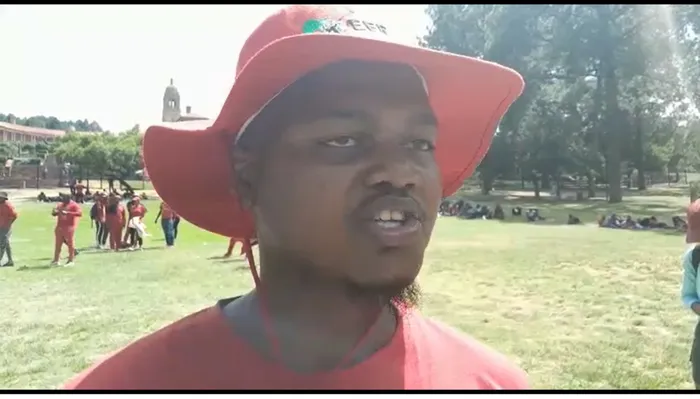EFF demands change in higher education sector, scrapping of all student debt

EFF Student Command president Sihle Lonzi at the Union Buildings after their march from Johannesburg to Pretoria. Picture: Oupa Mokoena/African News Agency (ANA)
Pretoria - The EFF Student Command is calling for the expansion of the higher education sector and the scrapping of all student debt.
This is in spite of assurances by Higher Education, Science and Technology Minister Dr Blade Nzimande that the post-schooling sector was on the ball with handling key student issues, the student movement has said.
It demonstrated this by embarking on a 16-hour walk from the EFF’s headquarters at Winnie Madikizela Mandela House in Johannesburg to the Union Buildings in Pretoria.
EFF Student Command president Sihle Lonzi, speaking following the arrival of the party members at the Union Building, said that it was important for the student formation to embark on a walk to highlight the plight of students.
♦️Happening Now♦️
— EFF Students’ Command (EFFSC) (@EFFStudents) January 25, 2023
The 16 Hours Walk to the Union Buildings with the EFFSC Leadership led by the President @SihleLonzi continues.
Join young people as they demand free decolonized education for all pic.twitter.com/qvgda3kTv8
He added students were dealing with a government that did not understand their issues on the ground.
According to Lonzi, there was an enrolment crisis in the country’s higher education sector of large sums of learners which the sector was unable to absorb for many years now.
He said that there were roughly 720 000 learners who had passed the 2022 National Senior Certificate examinations. However, the government had no plan on how they were going to absorb the learners into post-secondary education.
“This means we are going to have a situation where more than 500 000, if not more, learners will be forced to go back to the township and rural areas, and they will never have any employability or work opportunities.
"This government must be able to expand post-secondary education and we're not just talking about universities, but the TVET sector and many other opportunities and facilities that speak directly to building skills. All of this is so that we can have a skilful workforce that can be able to give back and develop the economy of South Africa,” he said.
In addition, Lonzi said that they wanted the government to unconditionally clear all historical debt of students at institutions, as there were some rogue institutions who used a “warped logic” when it came to handling issues of student debt.
“You have institutions which say a student has indeed completed all of their modules and has graduated but they withhold their certificates or degree under the pretext that they have debt. The same institution forces students to come back and pay that debt.”
He said, however, this action placed many students in a precarious situation as this resulted in them being unable to find a job or make means to pay off the debt.
“We want an unconditional clearance of all historical debt as primarily the struggle was for free education. We want walk-in applications in all institutions and for the government to force them (institutions).
“Basic Education Minister Angie Motshekga released the matric results late and the consequence of that is that we have students from underprivileged backgrounds who were unable to apply to certain institutions because of the uncertainty of the results. Not everyone can access a laptop and apply in Grade 11 like most of these privileged high schools.”
The crux of their call Lonzi said was for the rural child who got seven distinctions to be able to walk into any institution where they qualified and be admitted and not stopped due to not having access to the internet facilities.
He said that they also wanted free registration and all financial constraints limiting someone’s educational opportunities to be removed.
“It was important for us to do something like this as South Africa likes to project us as if we are crazy people protesting for nothing. We do this to demonstrate that we are able to sit down at the table and negotiate how we better the lives of youth and children in the country.”
Earlier in the week, Nzimande in detailing the state of readiness of the post-school sector for the 2023 academic year, acknowledged that the enrolment of learners, particularly with the TVET sector was substantially lower than what was needed for the government to succeed in its colleges enrolment plan 2030.
He said that while their 2030 enrolment plan for TVET colleges seeks to obtain 2.5 million students as projected by the National Development Plan, the country was only sitting at 497 032.
Nzimande said that in spite of this the sector was working hard on its plans to ensure that they accelerated the growth of the sector.
Pretoria News